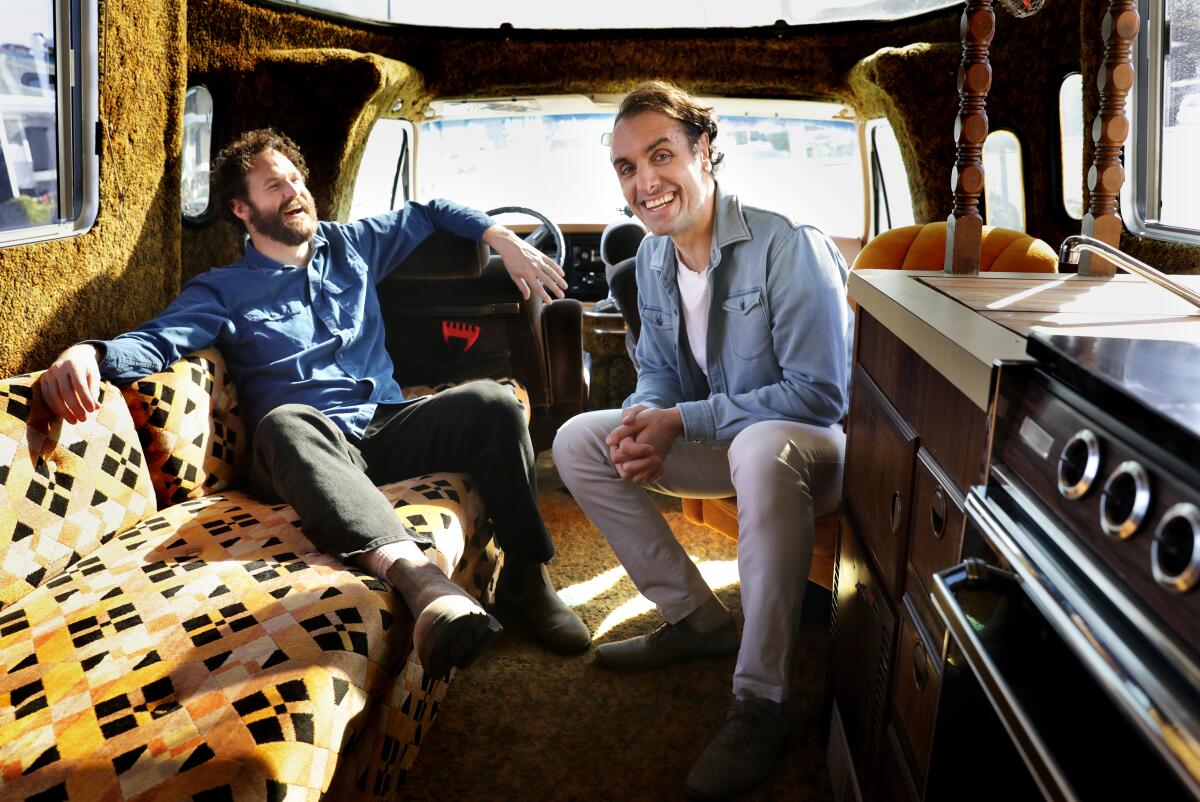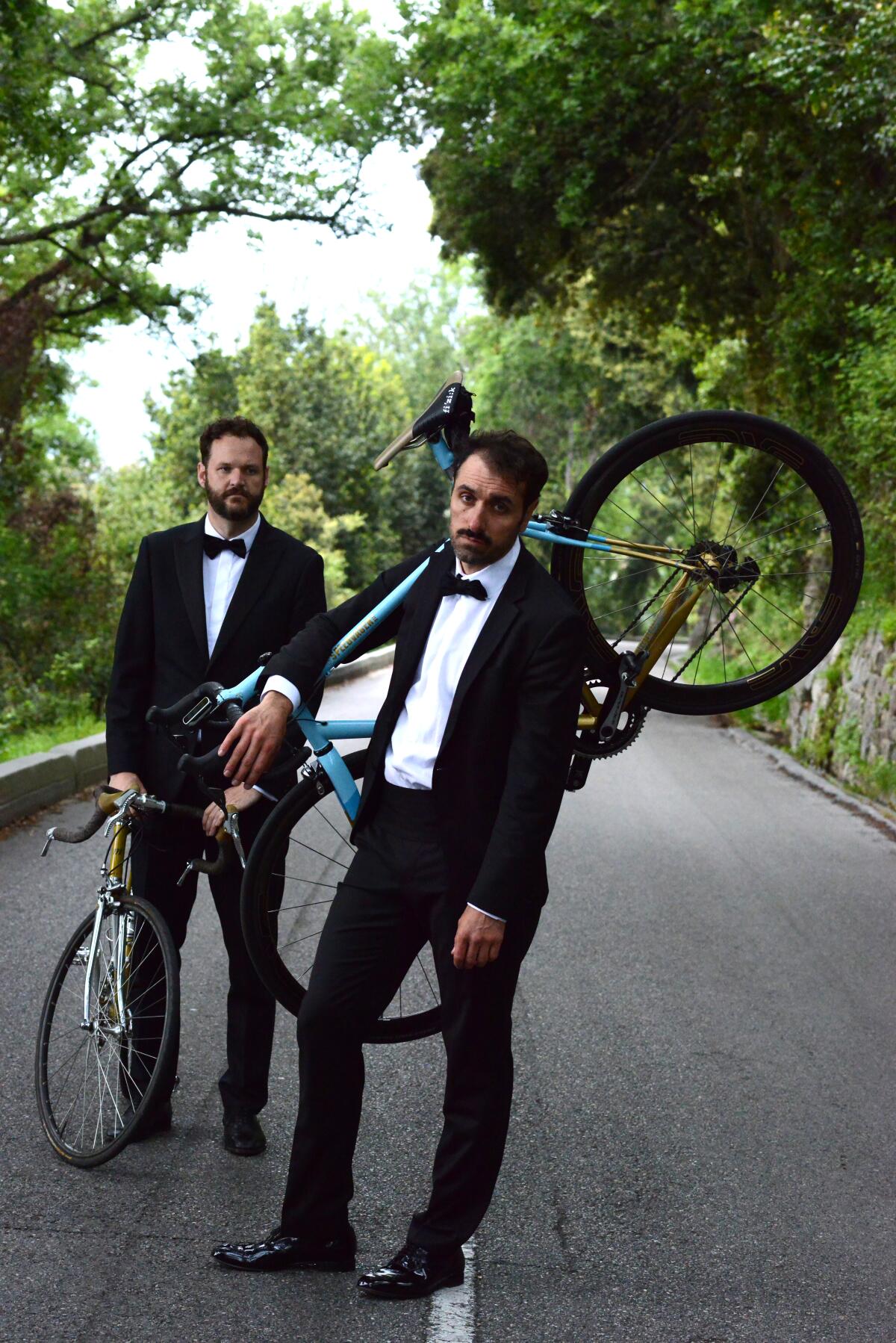Writers explain how ‘The Climb’ explores the romance of settling

- Share via
Michael Angelo Covino: The initial concept for this film came to me after a friend of mine slept with my ex and I was riding a bike up a mountain in L.A. trying to clear my head.
Kyle Marvin: At the time, we were working on commercials in L.A., so we were together every day. Mike showed me some pages he had written for what would eventually become the short film. We immediately started talking it through and playing with it. This process really became the foundation of how we wrote the whole film. We would write something, perform it by ourselves or with friends, feel it out, play with it, explore things and then rewrite.
Covino: From the very beginning what was exciting to us was to look at how we all cope with and process disappointment and betrayal. I found myself laughing at the absurdity of me taking my friends’ betrayal so seriously, and I started questioning, why do I care so deeply about this? I didn’t have a good answer, because it doesn’t really make sense. Kyle and I always talk about how the more painful a situation is, or the more heartbreaking, or uncomfortable, the more exciting it is as a place to find humor. Pain, discomfort and comedy all live next door to each other; that’s why we can switch so easily from laughter to tears.
Marvin: Crying and laughter are in a way harmonics, both give relief to pressure. They are almost interchangeable forms of catharsis to a situation, an expression of acknowledging the absurdity of what’s happening or of life. That was something that we were acutely aware of when writing and something that guided our decisions in when and where we would place comedy in the scenes. But the goal was to not overwhelm the film with too much comedy, so we were always trying to find a balance between tragedy and comedy in the writing and in the performances.
Covino: We spent a lot of our time focusing on the dynamic between Mike, Kyle and Marissa. As we were writing, we watched a lot of French cinema and found these recurring themes and situations of love triangles and people coming to accept their imperfect state of affairs. I’ve always found it interesting to explore the idea that the more messy something is, the more romantic it is. It’s this idea that a relationship hasn’t fully become as strong and resilient as it can be unless it’s been through a lot, that a friendship needs to be tested to become a deep friendship.
Marvin: The goal was always to put pressure on the characters, not just from the people around them and the emotional stakes of what is happening in their lives, but actual external physical pressure. We wanted things like mountain roads, frozen ice, houses and cars to be constantly imposing themselves on the characters. It made for scenes where the environment was helping us to shape the scenes and how they unfolded.

Covino: What was interesting was to focus on scenes that were expected and at the same time not expected. You expect a Christmas scene, a wedding scene, a funeral scene, a bachelor party, the first day a kid rides a bike. But we wanted to explore these milestones in a way where they become about something else. The wedding isn’t about where we say how much we love each other and kiss, it’s about admitting the things we don’t like about the other person and coming to terms with the fact that sometimes a wedding is about settling. There’s a beauty in that, because at a certain point in our life we settle, and there’s something really romantic about it.
Marvin: That’s tonally where this movie lives. The characters don’t necessarily grow in that they evolve into some advanced and more capable and successful versions of themselves. They grow in their ability to accept, understand and be comfortable with the people around them and their own life’s journey.
Covino: To me that feels like real life; it’s always moving. People die, you experience pain, you experience joy, you achieve your dreams, but you also fail at a lot of them. All those things happen at some point or another, but life always moves forward.
Marvin: Don’t take it too seriously.
Covino: Yeah, sometimes you have to laugh.
More to Read
Sign up for The Envelope
Get exclusive awards season news, in-depth interviews and columnist Glenn Whipp’s must-read analysis straight to your inbox.
You may occasionally receive promotional content from the Los Angeles Times.






